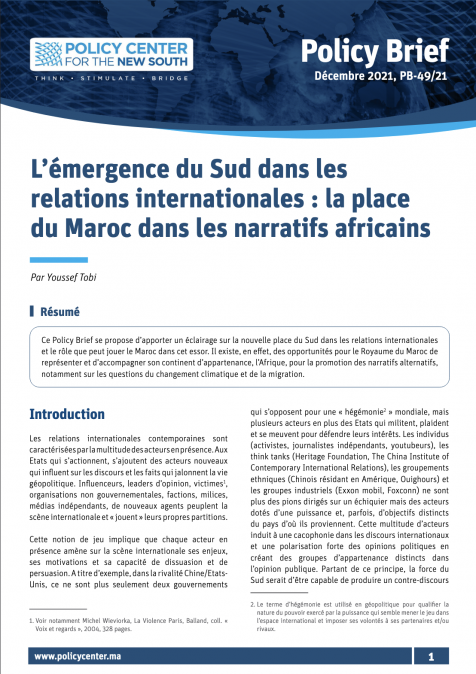حديث الثلاثاء: التعاون بين بلدان الجنوب والتعاون الثلاثي: الممارسات والآفاق
September 14, 2022
احتفل العالم في يوم 12 شتنبر بيوم الأمم المتحدة للتعاون بين دول الجنوب والتعاون الثلاثي. وفي هذا السياق فقد ازداد موضوع التعاون بين بلدان الجنوب أهمية على مدى العقد الماضي، لكونه يهدف إلى تعزيز التنمية الاقتصادية والاجتماعية بين البلدان النامية. فقد شكل هذا المنهج منذ الثمانينات من القرن المنصرم، إطاراً مفضلاً للعلاقات بين المغرب ودول اخرى في شتى بقاع العالم. فماذا نقصد بمفهوم التعاون بين دول الجنوب؟ ما هي الدول التي تلعب أهم دور في هذا المجال؟ أي آليات تستخدم لتعزيز هذا التعاون؟ وكيف يعمل المغرب ضمن هذا الإطار؟
Speakers

Fathallah Oualalou
Senior Fellow
Fathallah Oualalou is an economist, Senior Fellow at the Policy Center for the New South.
He obtained his PhD in economics from the University of Paris in 1968. Prior to joining the Policy Center for the New South, he served as a professor at Mohammed V University in Rabat and other higher education institutions in Morocco, and as an associate professor at several foreign universities. He is the author of numerous books and articles in the fields of economic theory, financial economics, international economic relations, the economies of Maghreb countries, the Arab world, and the Euro-Mediterranean area. In addition, he was the president of the Association of Moroccan Economists at the Union of Arab Economists.
His political activism began with the creation, in the 1960 ...

Akram Zaoui
Chargé de Mission to the Executive President
Akram Zaoui is a Senior International Relations Specialist and Chargé de Mission to the Executive President at the Policy Center for the New South (PCNS). Prior to this, he was Manager of Research Support and the Public Policy Lab at the PCNS. His main area of interest is the geopolitical economy of the Extended Middle East and North Africa (MENA) region.
From 2018 to 2020, Zaoui was the coordinator of a network of 70+ civil society organizations (CSOs) across France, working with foundations, government, local communities, and the private sector.
Zaoui holds a dual degree in corporate and public management from HEC Paris and Sciences Po, as well as a bachelor's degree (licence) in history from Université Paris 1 Panthéon-Sorbonne. He audited courses in Iranian and Shia Stud ...









